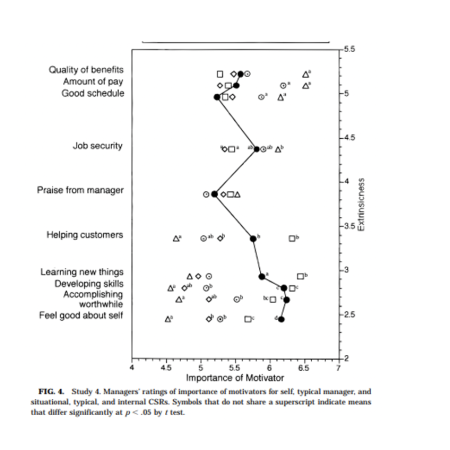Last month, for the first time since records began, the ONS reported that job vacancies in the UK outstripped unemployment. There are currently more than 1.3m unfilled job roles and an unemployment rate of 3.7%.
This labour shortage has led to increased job churn – in the first quarter of this year 994,000 people moved job. Once again, that’s the highest volume since records began.
This churn means that many businesses are concerned with how to retain their best staff. But what’s the ideal approach?
Well, a relevant finding comes from Chip Heath, a psychologist at Duke University, who argues that people have an inaccurate picture of other’s motivations at work.
In 1999 he published a study in the journal Organizational Behaviour and Human Decision Processes. For this experiment he recruited a group of managers and customer representatives at an American bank and asked them what motivated them at work. Next, he asked the same people to predict what the other participants would say when asked the same question.
Heath prompted everyone with a list of eight key drivers of job satisfaction. The first half of the list was made up of extrinsic motivations (e.g. pay, benefits etc) and the second half of intrinsic ones (e.g. developing skills, learning new things).
You can see the full list below:
- quality of benefits
- amount of pay
- job security
- a good schedule
- praise from manager
- helping customers
- learning new things
- developing skills
The results were clear. People said that they were primarily motivated by intrinsic factors, but others were primarily driven by extrinsic motivators.
So, for the managers they said the key motivators for themselves were, in rank of importance: developing skills, accomplishing something worthwhile and feeling good about themselves. However, they thought others in the same job would say they were most motivated by pay, a good schedule and job security. Predictions and reality were out of kilter.
You can see the data below for the managers (the customer service data is broadly similar). The black circles are the rankings people gave for themselves; the white spotted circles, the rankings they predicted others would give.

A widespread finding
This study isn’t a one-off. Kaplan Educational Centre ran a similar study among 486 prospective lawyers and found comparable results. 64% said they were pursuing a legal career as it was intellectually motivating. However, they thought only 12% of their peers were similarly driven.
Finally, the National Opinion Research Centre at the University of Chicago has conducted a long-running survey on job motivation. They ask the nationally representative participants to rank the importance of five elements of their jobs: pay, security, free time, chances for advancement, and the opportunity to do work that gives a feeling of accomplishment.
They repeatedly report results that support Heath’s findings – people claim they’re motivated by intrinsic drivers like the importance of the work, but that others are driven primarily by pay.
How to harness these findings
Heath points out that the extrinsic incentives bias creates problems for organisations. If companies misunderstand what genuinely motivates their staff, they’ll put the wrong policies in place.
The danger is they will focus solely on pay, benefits and security and put too little effort into emphasising and developing extrinsic aspects.
In Heath’s words:
[if bosses] assume that others’ motives are less noble then their own, then they may fail to communicate the importance and relevance of the organisation’s tasks… they may overlook the importance of feedback, neglect opportunities to make jobs more interesting and underestimate [employees] desires to participate in organisational decisions
So, if you’re looking to boost employee satisfaction heed Heath’s list. Of course, pay and benefits are important but if you can make work interesting, provide regular feedback, give people a sense of control and remind people of the importance of their work then you might have an even bigger impact on their morale.
And if you need more inspiration motivating others then Heath suggests listening to the words of 17th century philosopher, Thomas Hobbes:
Given the similitude of the thoughts and passions of one man to the thoughts and passions of another, whosoever looketh into himself and considerth what he doth when he does think, opine, reason, hope, fear, etc., and upon what grounds, he shall thereby read and know what are the thoughts and passions of all other men upon the like occasions.
Think about what would motivate you to stay and then do more of that. Sometimes it’s the simple things in life that are key.
Richard’s next workshop on applying behavioural science to marketing will be in September. Details here.
Featured image: Luis Domenech


































